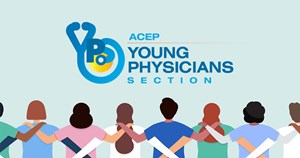Fellowship Spotlight: Helicopter EMS and Critical Care Transport with Dr. Stampfl
In this new video series, ACEP's Young Physicians Section explores the diverse world of emergency medicine fellowships. Our first episode features Matthew Stampfl, MD, a Critical Care Transport and Helicopter EMS fellow at the University of Wisconsin. Watch the video for a quick overview of his role, and keep reading for more details from the interview.
YPS: Tell us about your fellowship and what a typical day is like for you.
Dr. Stampfl: I'm a fellow in critical care transport and helicopter EMS here at the University of Wisconsin. The fellowship has a couple different key components. One piece is the clinical aspect of it—flying as a flight physician, being one of the primary care members of our flight team where we've got the flight physician, the flight nurse, and our pilots. So there's that clinical aspect that we do. That's a huge part of the fellowship.
And then the other big aspect of the fellowship is the administrative support and the research we do. How do you go about running and structuring a flight program? What are all the decisions that have to be made to keep things moving smoothly and to also press forward and do things better than we did them before?
In terms of a typical day, it, it really does vary day to day because of the way our schedule is set up. As a base for the fellowship, you do at least four 24-hour flight shifts a month. I'm doing six this month. So if I'm on a 24 hour shift, I'm at the base, kind of like a fire station. You have a place to sleep, you've got cooking facilities, but then tones might go off and you'll be flying out to take care of a really sick patient any time. So it's kind of that “being on call” experience.
Sometimes you get called a whole bunch, and it's a crazy day. Other days there's not a lot of calls or the weather's not very good, and then you end up doing a ton of other work while you're just hanging out at the base.
Other days when I’m not on for the flight part of the fellowship, and I may be in different meetings for program improvement or understanding our processes, trying to be more safe. My fellowship also includes 60 hours a month in the community emergency department.
YPS: What’s unique about this particular fellowship?
Dr. Stampfl: As far as I'm aware, I think it's the only flight fellowship like of its kind in the United States. There aren't a lot of physicians who fly on helicopters in the U.S. There are a handful of programs that will fly physicians, but most of those don't have fellowships. To break into this world of wanting to fly as a physician—this is a great way to do it. There are not a lot of other pathways to get there.
We have a really, really amazing setup with the support we have from our institution where we have three bases and three $10 million helicopters that have quite a bit of room for patient care. We can do some really cool things with all our device transports as well. So we're set up so we can transport people who are on ECMO and get that circuit in the back of the helicopter. We can do balloon pumps, we can do Impella transports, we can do nitric oxide. There are all kinds of really high technology things we can do with the support of our institution and the resources the program has. And these incredibly sick patients you know, who are out in rural Wisconsin – being able to stabilize them and get them back to tertiary care.
YPS: Why were you interested in this particular fellowship?
Dr. Stampfl: When I was in college and going into medical school, I got involved in collegiate EMS and I love that like hands-on contact with patient. Thinking about residency, I knew I wanted to do emergency medicine and as I was looking at residency programs, I saw that some of them had the opportunity for residents to fly and others didn't. The analogy in my mind was, collegiate EMS was to my college and med school experience as flight medicine will be to my residency experience.
I came to the University of Wisconsin for residency where we have this flight program, and I was able to fly as a resident and had a ton of fun with it. I'm actually doing a critical care fellowship next year, so this was a nice stepping stone where I could go do this flight program, take care of really sick patients and continue to build up my skills and also have this chance to practice as EM attending in community practice for this year before I kind of dive headfirst into critical care.
I'm interested in maintaining both parts of my practice in the future, and I did feel that if I went right to critical care and never had the chance to be an EM attending, it would be harder for me to establish my EM identity.
YPS: What has been your favorite and last favorite part about this fellowship?
Dr. Stampfl: The favorite part is the patient population you end up taking care of. Only really sick patients get called to fly. When you get called out, you get to take care of these really complicated, interesting patients. Sometimes they're on vents or sometimes I intubate them and put them on vents. They can be on a bunch of drips, they can be really sick with trauma required procedures, required blood transfusions. We carry eight units of blood products on the helicopter. That carefully-selected sick patient population—that’s one of the best parts of it. You to take these really meaningful patient contacts and we get to say, hey, this rural hospital needs help and we're able to get this patient to a better place both in terms of the care we're providing at the bedside and then also bringing them back to tertiary care.
Switching gears to the kind of least favorite aspect of the fellowship... I think part of the problem is Wisconsin winters. It's January now, so you get the low cloud cover and it's just stuck there for weeks and weeks on end. Even though we have IFR-capable helicopter—unfortunately because it's cold, these little clouds, if we fly into them, the helicopter ices and it's not safe. So we spend a lot of time being down for weather right now in this part of the year.
YPS: How do you intend to incorporate the lessons that you've learned within the fellowship and like for as far as it relates to your career plan? And is this an area of emergency medicine that you're hoping to pursue long term?
Dr. Stampfl: I’m going on to critical care fellowship after I finish this single year fellowship in MedFlight. So I'm going on to University of Washington to do medical critical care there. After that, I have this thought of trying to split time between EM and critical care, but I'm also interested in continuing to be involved in critical care transport and medical flight.
Depending on where I end up in the future, that may take different forms. There are only a handful of places in the country that routinely fight fly physicians on their helicopters, but there are lots and lots of flight programs and all of those flight programs need good medical directorship. The experience I've had in this fellowship, in the operations side, understanding how things are run, how we set up protocols and how to have the right processes for taking excellent care of patients – that’s been invaluable.
YPS: Do you have any advice for others who are interested in the in a medical flight fellowship?
Dr. Stampfl: I think one thing is, you know, depending on where you are, if you know, if you're like a med student listening to this and you're thinking about EM residencies, going to an EM residency that incorporates flight is a huge advantage. We do have away students who will sometimes come and do a rotation where they rotate with med flight for a month and have the chance to fly if they're able to, you know, get elective time and, and, and be able to come out here.
The other advice I would give is, if you're interested in doing the fellowship like this, it's good to reach out early to make connections. Our program is very receptive to hearing from people. The people in the flight industry are super friendly and love to share. Just be reaching out to programs to figure out what opportunities are available.



